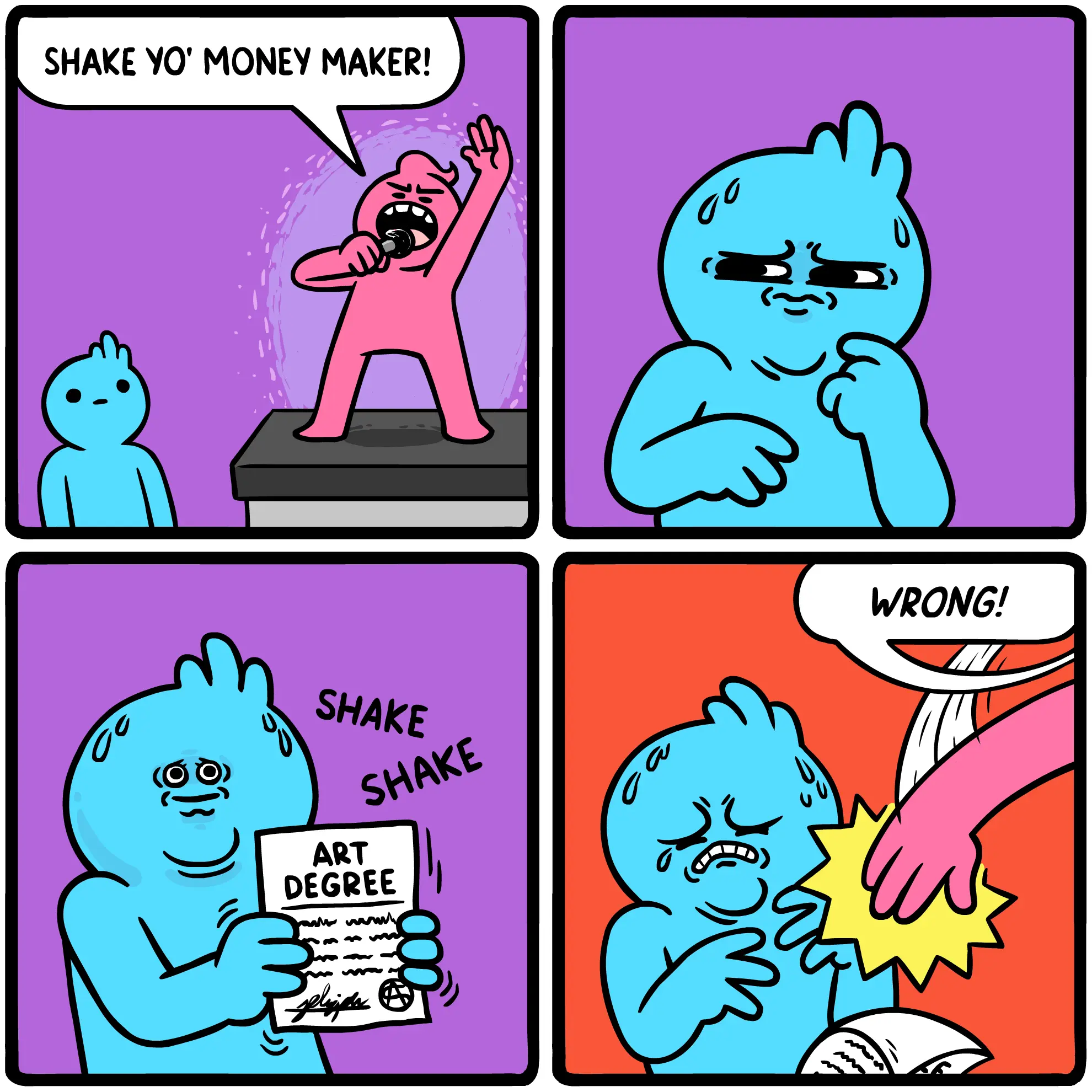Money Maker
Money Maker


Money Maker


People will spend tens of billions of dollars a year on art, music, literature, cinematography, graphics design, architecture, textiles, you name it. But knowing how to produce these things consistently fails to function as a good source of income.
Really makes you question where all that money is going.
Furry porn commissions if the memes are right...
RIP VGCats
I've never heard it put this way before. That's a very good point.
Speak for yourself. I have a cut and sew shop and do quite well. Knowledge is power. Skill is rare.
Are sewing shops profitable? We have one in my town and to be honest, I've always assumed they were barely getting by. I love to sew and mend and have had the "maybe I could take in mending" dream, but nobody I know actually mends their clothing anyway. They just chuck em and order more from Amazon.
In the UK I got quite close to the Theatre World for a while and for Actors in the UK at least the problem seems to be that way more people go into Acting over there than the need for Actors with the result that most earn less than minimum wage in average from Action (which is possible under UK work laws because actors are freelancers and most spend long periods without any income from it between jobs).
Judging by other areas such as Tech Startups and Game Making and from what I know indirectly from the Fashion World, which all seem to be quite exploitative and pay below average for most people working in it, I think all professions that have an image of Glamour (in a broad sense) end up with most of people working there making comparativelly peanuts even if there are a handful of superstars and high level managerial types making tons of money.
Also, by the way, Architects make good money. Graphics Designers, on the other hand, not so much.
more people go into Acting over there than the need for Actors
I've heard this line more than once. But the problem I see isn't a lack of demand for talented actors nearly so much as a staggering pay gradiant between D-List and A-List talent.
Attempting to become an actor is enormously expensive, so even talented people can wash out quickly if they don't have rich family. Meanwhile, hacks with connections languish for entire careers.
I think all professions that have an image of Glamour (in a broad sense) end up with most of people working there making comparativelly peanuts even if there are a handful of superstars and high level managerial types making tons of money.
That has been my experience (tangentially). It's the original Hustle Culture. Doing tons of work for "exposure" and waiting your life to make it big, while other people in better networked positions make money grinding talent through a low pay system.
In the uk: arts investment on average returns twice what is put in to it. The problem is this is often non profit funding that is returned back to communities and organizations and not realized as profit and thus people think it's bad. No, it doubled the money, but then used the money on good shit and didn't just leave it sitting in a bank to accrue interest. That's a good thing.
That's simultaneously a shit-ton of money and not that much money.
$100k, which would be successful lifetime sales numbers for a smallish indie game (an industry where the upfront capital requirements are as low as they get, you only need skills and time) is just an IT consultant's gross yearly revenue, a couple "medium-high effort" B2B contracts for an SME, or around a month of OpEx for a decent McDonald's franchisee.
Not to say big corps don't severely exploit creatives for profit. But I also do not believe that solving that particular issue would solve artists' precarity. The entertainment industry just isn't profitable enough to sustain everyone's wish to work in a creative field.
I'm sure other people have brought up rich people taking a huge share of it already, but there's also the sheer number of people determined to work in the arts. If there's, say, ten billion dollars to go around, it sounds like a lot, but if it's split between a couple of million artists it doesn't go very far.
the sheer number of people determined to work in the arts
There's a strong demand for artistic talent across a number of lucrative industries. The big question is how much you want to work in advertising and marketing.
ten billion dollars to go around, it sounds like a lot, but if it’s split between a couple of million artists
Tens of billions. Cinema ticket sales in the US alone grossed $10.6B in 2023. Music revenues were another $11.7B. Meanwhile, you're talking about a workforce on the scale of around 400k people domestically, as recently as 2024 (a big rebound after COVID knocked the number down to the low 300ks). And that's including a bunch of part-time work, like the role of extras and part-time screenwriters.
The money is going to the 11 people who are actually desirably good at those things as well as the networks of people / businesses / etc who support them. Make no mistake, there is bloat there and people who are undeserving but still.
You can't control what people like, or how good others are at doing the thing people like. Consider the lines of people who try out for American Idol or so you think you can dance, or everyone you know who has ever been on a garage band. Basically none of them makes it big. People like things that are exceptional, and will not pay the same price for something your friend Clancy is "really good at" or "really likes to do".
Edit: Unless you mean "produce" like the actual printing firm that makes and distributes books famous people write, in which case it just seems like a job: I don't know that anyone gets rich or starves doing that.
You can’t control what people like, or how good others are at doing the thing people like.
It's less "controlling what people like" (which, I'd argue, billions in marketing suggests you absolutely can do) and more "controlling who gets paid for the work" (which, I'd argue, labor unions and labor laws suggest you can also absolutely do).
People like things that are exceptional
People like things that are accessible and mass media allows large numbers of people to access a handful of cartelized venues. But go and watch the various American Idol knock-offs, and you'll find plenty of untalented people on the stage. Half the show is about the heels and how far they can get by schmoozing and scheming before they're knocked out by more mainstream talent. But its as much about the spectacle as it is about any actual talent.
Meanwhile, local musicians can and do command large audiences and full venues, particularly in cities known for cultivating talent. The trick is in having these venues to perform at and running them efficiently. When small venues get starved for revenue during downturns or crises (COVID, the '08 crash, Hurricane Katrina, etc), that's what kills a community scene. When rents skyrocket and drive community venues out of business, that's what costs a town its local venues. It isn't locals suddenly all forgetting how to perform year to year.
Shake the art, not your credentials!
If you can draw, what do you need a degree for?
Just open up commissions to do furry art and you'll be set for life.
speaking from experience I presume
Hey, I got one of those. It actually makes me money too.
Get Up (Feel Like Being An Art School Machine)